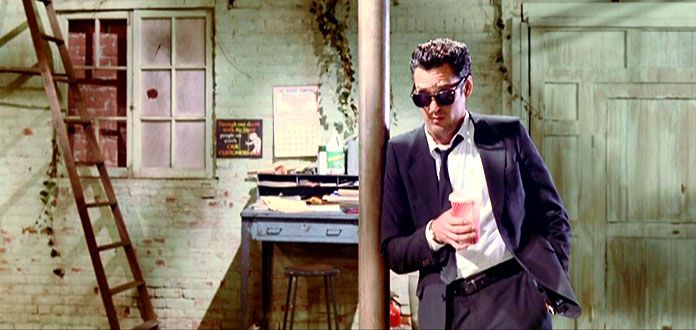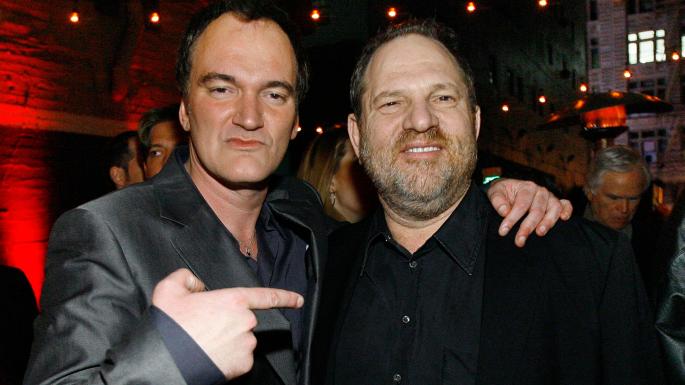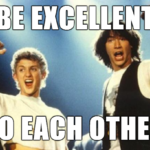There were many reasons why Quentin Tarantino’s “Reservoir Dogs” exploded through Hollywood, but they were all overshadowed by one scene in the movie and that was actually Tarantino’s first and best point.

That’s Michael Madsen playing a character in Tarantino’s first movie, his real name is Vic Vega and his alias is Mr. Blonde. He embodies a lot of things that Quentin Tarantino was and still is obsessed. He’s a version of Elvis; he talks cool; he’s loyal; he can be very funny; and he tells the truth.
He is also psychotically violent.
All of this causes a perfectly planned robbery to go bad in every single way. Mr. Blonde made the perfect heist ugly, but it was never going to be successful, because Tim Roth’s Mr. Orange is lying in that warehouse covered in blood slowly and painfully dying from a random gunshot to the gut, and he is a police mole.
Mr. Blonde is not stupid. He has figured out that there was a mole, and grabbed a cop, gagged him, and threw him into the trunk of his car in the first of many classic Tarantino car trunk scenes.
By the time Mr. Blonde gets the cop alone, his victim has already been beaten, he’s already bloody and he knows that he is about to be tortured.
He’s a rookie officer, but he is brave and tells his assailant that he can torture him all that he wants. Mr. Blonde says coolly in all senses of the term, “Torture you? That’s a good … that’s a good idea.”
There isn’t a single point where you should think that Mr. Blonde isn’t exactly what he is and isn’t going to do exactly what he says that he is going to do, but because of past movie tropes the audience never believed him. They thought there was a method to his madness, but there was nothing but madness.
“Look kid, I’m not gonna bullshit you, okay? I don’t give a good fuck what you know, or don’t know, but I’m gonna torture you anyway… regardless. Not to get information. It’s amusing, to me, to torture a cop. You can say anything you want because I’ve heard it all before. All you can do is pray for a quick death, which you ain’t gonna get.”
No big deal, we’ve all seen a million movies and Quentin Tarantino has seen ten million movies.
This is just a strategic ploy to get the cop to talk, and you are at all times entertained by how cool Mr. Blonde is and how much he is enjoying this charade. He’s not going to just torture the cop, he’s going to do it with a soundtrack and dance through it. By this time the cop is gagged with duct tape and can’t talk even if that’s what he wants to do.
Mr. Blonde laughs as he does it, and the audience laughs with him.
It’s all great fun until Mr. Blonde does indeed cut the cop’s ear off, which had pretty much never happened on film even though it probably often happened in real life.
The whole scene sounds like a horrible, elaborate, and sadistic practical joke.
The guy who wrote it and shot it, he did take great glee laughing at it. He had made the audience complicit in an act of true horror. People were upset; people walked out; even directors who had made movies with scenes that had made people walk out, walked out. Tarantino took great joy in all of it.
Tarantino even took a song that he loved, Stealer’s Wheel’s “Stuck in the Middle with You,” and changed it forever. What had once been a lightweight parody of Bob Dylan would now always be heard as the soundtrack to the guy getting his ear cut off.
What people do not remember and didn’t even realize after they saw the scene is that they never saw the ear get cut off!
There was a prank aspect to that scene, which its writer/director really loved, but it was maybe really only 1% of the scene. You do not see the ear get cut off.
The camera pans to the corner of the room and what you do see is an archway from a conveyor belt that says “Watch your head” over it, and that archway is a door to the future.
It’s not really a prank, it’s an artistic statement on movie violence that would be perhaps be Tarantino’s biggest obsession.
Here is Lenny Bruce summarizing up everything that got him hauled off to jail and put on trial for just words and ideas.
Within that is implied something else he did talk about that was very true. He talked about how parents would let their kids see any violent movie they wanted as long as they never saw any porn, but that most porn at that time was merely two people expressing love and there was nothing violent in it and there probably wasn’t anything else in it but a man putting a pillow down gently for his lover.
Whether that was true about X rated movies then, it isn’t now, but it doesn’t really matter. It doesn’t really matter because it is still true about violent movies. Back when there were “Blockbuster Video” stores parents would let their young children rent incredibly violent movies like “Terminator 2: Judgement Day,” without batting an eye, and a video store is where Quentin Tarantino had spent most of his life working.
There are many types of violence in movies ranging over the entire spectrum.
On one level there is this:
Kids saw that for years and loved all of it, but whoever put that compilation together had an agenda. If you get shot in the head, or blown up there are major repercussions, but in those Warner Brothers “Looney Tunes” cartoons there were rarely any repercussions. When at the end of that clip Daffy Duck does die and says that it is entertaining, but that he “could only do it once,” it had a double meaning. You can only blow yourself up once, but that was also maybe the only time that those cartoons showed that.
99.9% of the time, if you fell of a cliff, or got shot in the head, or had your head hit with a frying pan so hard that your head ended up looking like that frying pan, by the next scene you would be fine and back to normal.
At the other end of the movie violence spectrum was this:
Depending on the person, someone can either get through about a minute of that or watch it all ten times in a row. The “Wild Bunch” shot by Sam Peckinpah is realistically violent and the violence has repercussions, maybe too many. It’s a veritable orgy of deaths.
Peckinpah had a philosophy about why he shot scenes like that and he at some point regretted it. This may not be his final thoughts on it. He may have wavered daily on it as perhaps he should have.
I like to tell people that I hate guns in real life, but I love them in movies. It’s clever and has some truths. I also tell people that I think that it’s a shame that a lot of prison’s have banned smoking, because every great prison movie revolves almost entirely around cigarettes.
There are probably things more important than movies. Whether Quentin Tarantino ever knew that or would acknowledge that before the Harvey Weinstein scandal could take up a week long symposium of discussions. Whether he knows that now is still unknown.
Reservoir Dogs did not show you the ear getting cut off in that scene, but it did have plenty of more violence.
Right after the ear gets cut off, Mr. Blonde is going to kill the cop without letting him talk. He is not only going to kill him, he is going to burn him alive with gasoline, but is stopped when the mole Mr. Orange regains consciousness and shoots him, and since it is a Tarantino movie he shoots him many times not just once.
The now earless cop can only think of himself, how sadistic his captor was, and his lost ear, which is likely hurting and will mark him as sort of a freak forever. The other cop, Mr. Orange has little sympathy for him.
“Fuck you! Fuck you! I’m fucking dying here! I’m fucking dying!”
That movie has an ton of incredible acting performances in it, especially for the fact that’s it’s all been spurred by a guy who had never really directed actors in a real movie. Perhaps the funniest joke of the movie is that the only one it is that isn’t an good actor is Tarantino, which is a huge prank on him, because in a lot of ways he would have rather been a great actor than a genius writer/director.
The best acting performance of all is by Tim Roth. His performance is not just great, it is entirely a meditation on acting, which is exactly what an undercover cop does for a living. You see him start out as a bad actor, become a great actor, and then when he gets shot become barely able to act at all. Mostly, what he does is suffer in real pathetic agony every second after he gets shot.
At least for that film, all the violence that Tarantino put into it had real life implications. So the real message of that movie is that violence in real life is not traditional movie violence, it is always ugly, painful, and usually leads to death.
Pretty much every movie Tarantino made since has also been a meditation on violence. There are scenes where hundreds die and you enjoy it, there are scenes where someone dies and you laugh, and there are scenes where there is only the threat of violence and it sickens you to the core.
There are two things that you can’t deny about Tarantino. One is that he is a genius movie maker and the other is that he may love movies and the making of movies way too much. You can see in that Peckinpah clip,that you can use movies to do incredibly positive things, but that if they lead to one bad thing that it may haunt you forever.
I do think that Tarantino honestly has done plenty of reflection on the impact of his movies.
It is also true that you can make a movie that saves 10,000 lives, but if it even seems to have inspired one murder that it might haunt you forever.
Most artists only care about their art, I write about them all of the time, and mostly laud them. I love their art and I love what has come from the art I love.
Almost all of the time, those artists have to deal with the business side of their art and don’t want to or are incapable of it, and there are endless stories about it.
You have Elvis Presley, whose art and dreams were compromised by Tom Parker, who only cared about money. Actually, the only thing Tom Parker ever promised Elvis Presley was money.
Brian Epstein helped push the Beatles over the brink, business wise he was fairly incompetent, and both his death and his financial naivete led to their breakup.
You have complex relationships like Albert Grossman with Bob Dylan.
You have pure evil like Allan Klein with Sam Cooke, the Rolling Stones, the Beatles, and countless others.
Best case you may have Jon Landau, who saw something in Bruce Springsteen and helped him become the artist that he wanted to be and protected him from those who would harm his artistic integrity.
Sometimes you only have Peter Grant, who was a sort of sadistic violent guy who took care of his band Led Zeppelin.My grandfather told me that. Stop worrying about the world and take care of your own.
Harvey Weinstein is a lot like Peter Grant.
When the Harvey Weinstein scandal hit, I did think about the women a lot. I already cared about the women. I have never even remotely treated a woman like Harvey Weinstein has. Almost all of what he did was inconceivable to me, not just from a how could he do something so horrible standpoint, but from a why would he even want to do that perspective.
Maybe wrongly, I thought too much about Quentin Tarantino. The point may be that Quentin Tarantino cares far too much about movies and that we all care way too much about movies that is the ultimate point I think.
We definitely care way to much about fame and celebrities.
Tarantino’s entire life was a dream about getting to make movies.
Elvis Presley’s entire life was a dream about getting his mother out of poverty, Tom Parker did do that for Elvis Presley after he promised to do that and only that, which is why the rest of Presley’s life was all about his conflicted loyalty to Tom Parker.
Artistically, Harvey Weinstein was a lot better to Quentin Tarantino than Tom Parker was to Elvis Presley. Tarantino had a guy who would stop at nothing to let him achieve his dreams in exactly the fashion he wanted to do so.
I don’t think that you can name another artist that has had more control and creative freedom that Quentin Tarantino has. There are plenty of directors making films on shoestring budgets doing whatever they want, but Tarantino got to do whatever he wanted with hugely budgeted movies. He got as much money as he wanted to do anything he wanted, and in that way was the exact opposite of the person who people do love movies too much consider their greatest martyr, Orson Welles.
Harvey Weinstein did that for Quentin Tarantino. That’s pretty undeniable and for most artists that is very attractive.
Consider Eric Clapton and a lot of people who either once or did consider themselves to be blues purists. Their ultimate artistic ideal is Robert Johnson, who will be forever known to them as a complete nobody who made a deal with the devil to make great art and then died without seeing the impact of that art. All of those artists seem to see it as heroic.
That is potentially a really sick mindset. There have been endless pages written about artists doing horrible things to get their art made the way they wanted it made and most of it has been treated romantically.
I give Tarantino some credit, because I think that he did think about these things a lot. He probably did agonize over things he did to make movies and probably is agonizing even more about it now. That still might be not be enough for history to not find him to be villainous. It’s a mindset a lot of people are very conflicted about.
Sometimes people that care about art, don’t care about the impact of their art.
Even people whose myths were made around changing the world with their lives and art for the better may not stand up to scrutiny.
I could tell you maybe 1000 things that John Lennon did do to change himself and his art to make the world a better place and him a better person, but perhaps someone could then tell a story about something he did on a bad day in 1978 that almost no one alive knows about that would make the very notion come completely apart.
“We are the music-makers and we are the dreamers of dreams.”
That’s a very important movie quote to almost everybody that loves movies, and perhaps everybody that loves any kind of art.
On its shallowest level Willy Wonka may be just talking about candy, but if you watch that movie you can tell that he has deep conflicting emotions just about candy.
It’s actually a quote from the poet Arthur O’Shaunessy, and in that context I think it refers to the power of movies. In a broader context, it talks about the power of all art, and the dreams of all artists.
There are very few people in life that are respected who do not tell you to follow your dreams.
In the song “God” by John Lennon, he very sparsely contemplated his entire life.
God is a concept
By which we measure
Our pain
I’ll say it again
God is a concept
By which we measure
Our pain
He then listed everything he had ever dreamed about or clung to and decided everything had failed him. His group and his dreams perhaps most embodied an entire decade of tumult and pain. The single figure most respected figure from that decade is perhaps Martin Luther King, who did get assassinated as did John Lennon, and people want to take that man and crystallize everything he was ever about into four words that he said years before he died, “I have a dream.”
So John Lennon did then sang, “The dream is over.”
John Lennon always had another dream though. Even bigger than his musical and artistic ambitions all through his work he pined constantly for true love, another concept that maybe never really exists. In that moment, he thought he had it and admitted that was all he ever really wanted, and hoped to achieve.
I just believe in me
Yoko and me
And that’s reality
The dream is over
What can I say?
The dream is over
Yesterday
I was the dream weaver
But now I’m reborn
I was the Walrus
But now I’m John
And so dear friends
You just have to carry on
The dream is over
You can argue about the rest of his life and career all you want, but in that moment when he recorded that, there is purity and vision. He does not treat the end of his dream cynically or with defeat. He picks a different dream that he seems to consider better and more realistic. Whether it was or not doesn’t matter, what did matter was him saying “You just have to carry on,” because until we die, we pretty much can’t do anything else.
Harvey Weinstein made a lot of dreams come true for a lot of artists. The folly and lesson of Harvey Weinstein is that he thought that because he did that he could do it anyway he wanted and justify everything else he did with it. In that process, he ended a lot of dreams and destroyed a lot of lives.
There is no Karmic balance sheet to justify his behavior. If you got him in a room and provided him with the real tangible, horrible fallout of his actions that can likely be proven beyond a shadow of a doubt, he would respond with intangible premises about how much good his films did for the world. A premise that will possibly be argued about forever.
All that really remains is the tangible damage he definitely inflicted.
Quentin Tarantino still has the financial backing to carry on and make movies. His first movie not produced by Weinstein probably should be called “The Dream Is Over.”
It’s going to be called “Once Upon a Time in Hollywood,” and just that title alone tells you that he is still obsessed with his biggest obsession movies.
It’s going to be a gigantic film with a huge cast full of things that he has always been obsessed about, specifically Hollywood, Charles Manson, and the brutally violent and purposefully bloody murders of numerous people one ugly night that included a pregnant movie star named Sharon Tate, who was married to a philandering, acclaimed director named Roman Polanski; who was a victim of the Holocaust; who later went on to drug and rape an underage girl; and fled the country claiming that his artistic vision justified all of his personal crimes.
It will feature huge actors playing other legendary actors and artists that actually existed. You can take a list of the real people’s lives that movie will portray and throw a dart and any of those people will evoke emotions that millions of people have been obsessed with endlessly.
It’s a ludicrous task that in all ways could be ugly and horrible.
Sergio Leone someone Tarantino is also obsessed with made two “Once Upon a Time” movies. “Once Upon a Time in the West” was a career defining close to three hour epic Leone made in 1968. In 1984, he made his last film “Once Upon a Time in America,” that depending on how long the version is people will either call a sprawling mess or a masterpiece.
When John Lennon, wrote “God” and put a time stamp to the end of an era, he did so using the word “Beatles,” but that was the word he always used, and that was the reason he gave for saying “The Beatles are more popular than Jesus.”
Most people actually define the end of that turbulent generation’s dreams not to the end of the Beatles, but to the crimes of Charles Manson.
Wipe away the violent, bloody carnage of what Charles Manson did that affected so many people and what you will find is a very small, very untalented guy, who was willing to let the entire world burn, because no one cared to fulfill his artistic dreams and ambitions.
That film can easily encompass thousands of concepts that people have been obsessed with forever: Art, gender, greed, violence, celebrity, ambition, drugs, and crimes of nearly every level on the spectrum ever committed.
Pretty much only one director alive would get away with doing this after a huge scandal and it is Quentin Tarantino. It may have to do with money more than art. Just about anyone else would be consigned to making small budget art films in remote places they pretty much never leave, which is exactly the last 40 or so years of Roman Polanski’s career.
There is evidence that only Tarantino can try to do this, but there is a lot of evidence that he shouldn’t be allowed to do this. He 100% has complicity in Weinstein’s crimes. He has said incredibly insensitive things in the past about Polanski’s victim that seem to show that he does believe that good movies wipe away real crimes.
The downside of this film is nearly endless.
On a shallow basis it could merely be a end to a Tarantino “alternate history revenge” trilogy showing Bruce Lee who will be portrayed in the movie showing up and doing what Tarantino loved watching Bruce Lee do in movies. Bruce Lee knew all of the victims intimately as well as all of their closest celebrity friends who were also impacted. He could have been there that night. His closest friend Steve McQueen was almost there that night.
Hollywood loves trilogies and that movie could both top off “Inglorious Basterds” and “Django Unchained,” as well as be “Kill Bill: Volume 3.”
I don’t think that any sane person alive wants those murders depicted in any way on film in any fashion and especially by Quentin Tarantino even if he took a decade to consider how to do so.
What that film should be is his perhaps his final film. Like the ear being cut off in “Reservoir Dogs” none of the violence of that night should be in it.
Instead “Once Upon Hollywood” should be a reflective, rueful, contemplation of a place and time that everybody felt was paradise full of complicated people of great fame, where a lot of both good and ugly things happened, and it should contemplate what happened when the worst of the lot let his personal dreams, ambitions and actions potentially destroy it forever.
It should in all ways be an apology for a shortsighted dream and a cry for the ability to choose a more limited, better one to carry on with until he passes and leaves only his films behind.
That may also be true for the entire cast and the entire history of the city.







